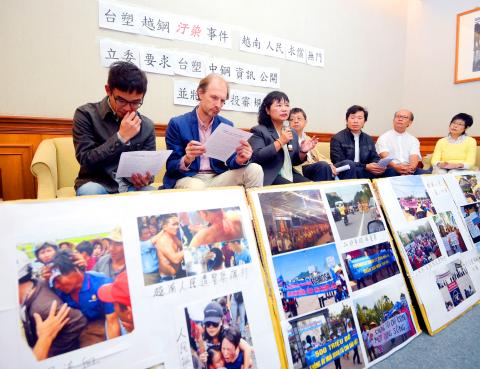A Vietnamese Catholic priest yesterday held a news conference in Taipei to complain about the operations of Formosa Ha Tinh Steel Corp, a Vietnamese subsidiary of Formosa Plastics Group (FPG).
Father Nguyen Dihn Thuc from the Catholic Diocese of Vinh, who was accompanied at the news conference by Taiwanese lawmakers and representatives of several non-governmental organizations, said pollution from the plant in Ha Tinh Province has severely affected the region’s residents physically and spiritually.
Vietnamese fishermen have been particularly affected as massive numbers of fish were poisoned by chemicals discharged by the steel plant in April, and without fish to sell, they are unable to buy food for their families or provide schooling for their children, Nguyen said.

Photo: Huang Yao-cheng, Taipei Times
He said he hopes the Legislative Yuan could help the Vietnamese in three ways: by demanding that the company publicize information about the level of pollution emitted by the steel plant; by providing specific details about cleanup efforts and compensation; and by ensuring that the plant is outfitted with proper equipment to process pollutants.
FPG on July 7 promised to pay US$500 million compensation to residents affected by the discharge of toxic waste and massive fish deaths in April.
The money has yet to be paid to the region’s residents, Nguyen said.
FPG should also be responsible for paying for health check-ups for those residents affected by the spill in April, he said.
If the steel plant cannot guarantee transparency of information, then it should be shut down and asked to leave Vietnam, Nguyen said.
The pollution caused by the plant has damaged Taiwan’s national reputation and would affect President Tsai Ing-wen’s (蔡英文) “new southbound policy,” he said.
The government and private corporations should take responsibility, Democratic Progressive Party (DPP) Legislator Su Chih-fen (蘇治芬) said, adding that she would ask the company to provide specific plans on how it plans to compensate for the damage.
Su said that she would pressure Formosa Plastics through state-run China Steel Corp, which holds a 25 percent stake in the company, adding that Taiwan should help other nations through democratic means while maintaining responsibility toward environmental conservation.
DPP Legislator Wu Kun-yuh (吳焜裕) said that during his most recent visit to Vietnam, he saw an increasing emphasis by the Vietnamese government on environmental protection.
Taiwan’s government should ensure that such concerns are included when it drafts its plans for the “new southbound policy,” he said.
Wu said that Taiwanese businesspeople abroad should ensure that environmental protection is a key part of their investments and make a good impression for Taiwanese businesspeople in general.
DPP Legislator Chen Man-li (陳曼麗) said the Legislative Yuan should consider ways that it could legally ensure Taiwanese investors adhere to corporate morals, adding that she would talk with the Executive Yuan about the issue.
While Nguyen said the affected residents have yet to receive compensation from FPG, Vietnamese Minister of Natural Resources and the Environment Tran Hong Ha said in a televised meeting held by the Vietnamese parliament on July 30 that FPG had paid US$250 million in compensation on July 28 and that the remainder was expected to be paid on Aug. 28.
Additional reporting by Diane Baker

Alain Robert, known as the "French Spider-Man," praised Alex Honnold as exceptionally well-prepared after the US climber completed a free solo ascent of Taipei 101 yesterday. Robert said Honnold's ascent of the 508m-tall skyscraper in just more than one-and-a-half hours without using safety ropes or equipment was a remarkable achievement. "This is my life," he said in an interview conducted in French, adding that he liked the feeling of being "on the edge of danger." The 63-year-old Frenchman climbed Taipei 101 using ropes in December 2004, taking about four hours to reach the top. On a one-to-10 scale of difficulty, Robert said Taipei 101

Nipah virus infection is to be officially listed as a category 5 notifiable infectious disease in Taiwan in March, while clinical treatment guidelines are being formulated, the Centers for Disease Control (CDC) said yesterday. With Nipah infections being reported in other countries and considering its relatively high fatality rate, the centers on Jan. 16 announced that it would be listed as a notifiable infectious disease to bolster the nation’s systematic early warning system and increase public awareness, the CDC said. Bangladesh reported four fatal cases last year in separate districts, with three linked to raw date palm sap consumption, CDC Epidemic Intelligence

Taiwanese and US defense groups are collaborating to introduce deployable, semi-autonomous manufacturing systems for drones and components in a boost to the nation’s supply chain resilience. Taiwan’s G-Tech Optroelectronics Corp subsidiary GTOC and the US’ Aerkomm Inc on Friday announced an agreement with fellow US-based Firestorm Lab to adopt the latter’s xCell, a technology featuring 3D printers fitted in 6.1m container units. The systems enable aerial platforms and parts to be produced in high volumes from dispersed nodes capable of rapid redeployment, to minimize the risk of enemy strikes and to meet field requirements, they said. Firestorm chief technology officer Ian Muceus said

MORE FALL: An investigation into one of Xi’s key cronies, part of a broader ‘anti-corruption’ drive, indicates that he might have a deep distrust in the military, an expert said China’s latest military purge underscores systemic risks in its shift from collective leadership to sole rule under Chinese President Xi Jinping (習近平), and could disrupt its chain of command and military capabilities, a national security official said yesterday. If decisionmaking within the Chinese Communist Party has become “irrational” under one-man rule, the Taiwan Strait and the regional situation must be approached with extreme caution, given unforeseen risks, they added. The anonymous official made the remarks as China’s Central Military Commission Vice Chairman Zhang Youxia (張又俠) and Joint Staff Department Chief of Staff Liu Zhenli (劉振立) were reportedly being investigated for suspected “serious